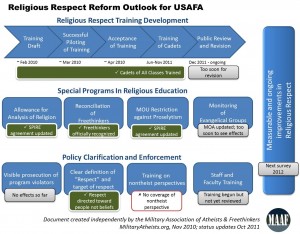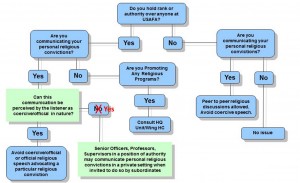Academy-Atheist Collaboration Continues to Bear Fruit
 Continuing what is now nearly a year of collaboration, the Air Force Academy has made significant changes to training as a result of reviews by the Military Association of Atheists & Freethinkers. New training for senior cadets includes stricter language on government prayer, direct references to the nonreligious, and specific scenarios to clarify boundaries on religious expression.
Continuing what is now nearly a year of collaboration, the Air Force Academy has made significant changes to training as a result of reviews by the Military Association of Atheists & Freethinkers. New training for senior cadets includes stricter language on government prayer, direct references to the nonreligious, and specific scenarios to clarify boundaries on religious expression.
The training, given to First Class (senior) cadets at the Academy is intended to “affirm both clauses of the First Amendment, establishment and free exercise. This helps to ensure that “the USAF remains officially neutral regarding religious believes (to include absence of belief.” The training has reached over 1000 senior cadets who provide cadet leadership for the Corps. This training adds to first-year cadet training conducted in the fall as well as Cadre training for sophomores and juniors during summer training. Faculty were also presented scenarios for discussion.
MAAF was able to obtain major changes in this training, including an emphasis on the dangers of “government prayer” – that is prayer given by government officials or conducted in official government activities. The previous versions referred simply to “public prayer,” which would confuse the difference between personal religious expression in public and religious expression tied closely to government activities.
Included also is an explicit reference to the feelings of atheists, saying “nonreligious service members may feel excluded during the provision of any formal, public prayer.” “Ceremonial Deism,” a sort of sterilized prayer, is authorized for use in official situations. The Academy can’t change that, but they have recognized that it marginalizes those who don’t pray (not to mention those who seek more sectarian prayers).
The training is also much more firm in its wording. The original text included statements that there are ‘no absolutes’ and that individual situations may warrant alternate decisions. Also, the approach included discussion of scenarios and reporting of results. Due to MAAF suggestions, the training now emphasizes the requirement to adhere to regulations in all situations. One scenario provides for a special, subordinate-requested religious discussion, and this provides a clear and limited exception so long as a leader clarifying “that these are your personal beliefs only and not your command policy,” and “being wary of any actions that could be perceived as undue influence or misuse of authority.”
Only one important suggested edit was not included, and that was with respect to the nature of voluntary and mandatory events. The Academy included certain examples as clarification, but did not have suggested explanations like the level of advertising, general expectation of attendance, consequences (social and otherwise) of not attending, and proximity to official events (e.g., a prayer 5 minutes before an mandatory event in the same location is essentially mandatory). Providing more explicit treatment of these special cases would mitigate the possibility of ‘gaming’ the system.
 The training now includes strong injunctions against command promotion of religion, explicit prevention of “government prayer,” references to non-chaplain resources like legal and equal opportunity personnel, the fact that harassment applies to religious and anti-religious speech just like race or gender, and the importance of caution and personal disclaimers when discussing religion.
The training now includes strong injunctions against command promotion of religion, explicit prevention of “government prayer,” references to non-chaplain resources like legal and equal opportunity personnel, the fact that harassment applies to religious and anti-religious speech just like race or gender, and the importance of caution and personal disclaimers when discussing religion.
This effort continues previous successes between MAAF and the Academy, including last year’s Religious Respect Conference, changes in SPIRE training and changes in the Memorandum of Agreement for the Special Programs in Religious Education (SPIRE), meeting places for cadets. There have been continuing anonymous reports of religious bias, but there have also been positive discussions and improvements in policy. Continuing a trend of over a year, MAAF collaborative efforts have led to tangible action – humanist alternatives for trainees, meaningful changes in policy, effective diversity training, and continuing collaboration with nontheist leaders.
The journey continues, with this training forming the foundation for what must, in the end, include measurable changes in the command climate for matters of religion. Faculty training has begun as well. Faculty and staff are leaders in the corps and cadets learn from them. That training must continue. As all cadets, faculty, and staff are trained with new more respectful and stricter policies, climate will important. In addition, the Academy must lend legitimacy to new training by ensuring that violators are punished and that whistleblowers are praised. The way forward must include fair treatment of cadet Freethinkers and proper conduct by cadet Freethinkers, formal public complaints about issues that arise (rather than anonymous), continuing training for cadets, staff, and faculty, and Academy punishments of those that violate existing policy. Systematic changes combined with resolution of issues, reprimands for those who do wrong, and protection of whistleblowers will all support a positive command climate. In the end, valid and open command climate surveys will show whether free exercise and anti-establishment protections have come to the Academy.
